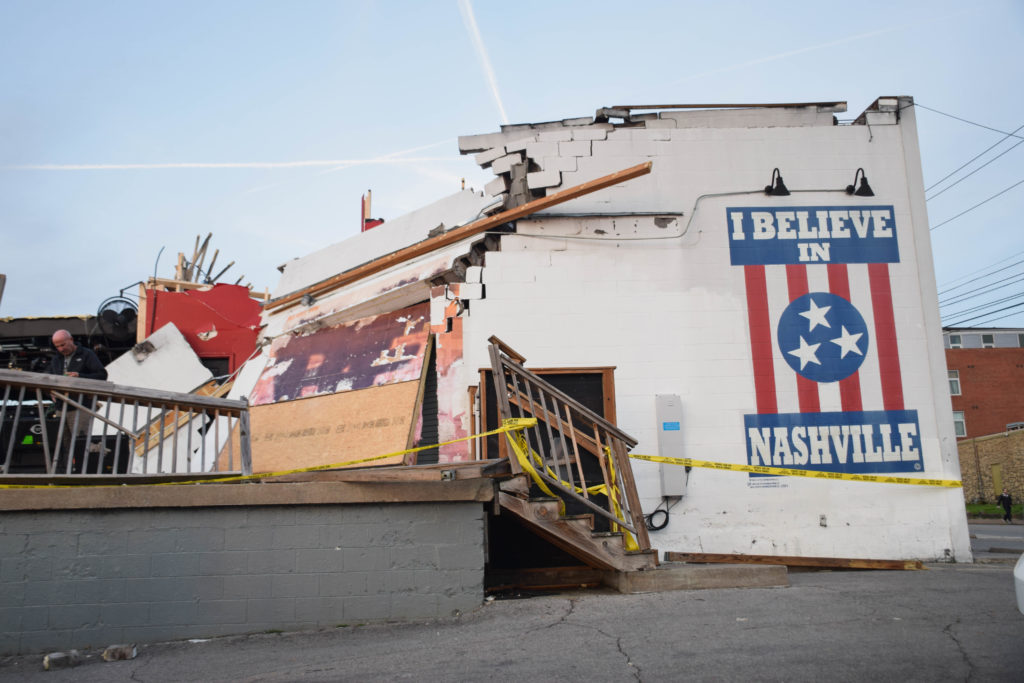
It has been two years since tornadoes touched down in Middle Tennessee on March 3, 2020. The tornadoes killed 25 people, destroyed more than 1,600 buildings — including more than 400 homes — and damaged some 2,700 others stretching from Benton County, through downtown and East Nashville, and into Cookeville.
This episode examines what has changed since the deadly storms. Host Khalil Ekulona speaks to residents who were displaced by the storms about how their lives were changed that night.
Later in the show, the conversation shifts to the steps you can take to stay safe during Nashville’s next major weather event.
Guests:
- WPLN Special Projects Editor Tony Gonzalez
- Tamara Williams, a Cookville resident who is rebuilding her family’s home after the storm
- Terry Warren, a Nashville resident who was displaced
- Krissy Hurley, warning coordination meteorologist with National Weather Service in Nashville
- Andrew Leeper of Nashville Severe Weather
- Lelan Statom, NewsChannel 5’s senior meteorologist
Quote to note:
“Think about when you’re making tacos. A taco watch – you put all of the ingredients out on your counter. You’re about to prepare some good taco dinner, right? So that’s a taco watch. (It’s the) same kind of thing in the atmosphere. All of the tornado ingredients are there ready to come together. But when you start making that taco and it’s about to go into your mouth, that’s when I’m going to issue a taco warning. The same kind of thing happens in the atmosphere when all of the tornado ingredients come together, and that’s when we issue that tornado warning.” – Krissy Hurley

Tornado truth or myth:
It will feel warm when a tornado is imminent. Myth. While warm air helps fuel a tornado, you won’t necessarily feel the temperature rise before a tornado hits, especially during the winter months.
Tornadoes can’t cross rivers. Myth. Hurley noted that the tornado that hit Mayfield, Kentucky in December jumped the Mississippi River.
Tornadoes can’t climb hills. Myth and tornadoes can also climb mountains. Statom used East Tennessee as an example because the Appalachian Mountains doesn’t prevent tornadoes from forming in that part of the state.
An approaching tornado will sound like a train. There’s some truth to this. The sound of tornadoes is frequently compared to trains or jet engines, but how a tornado sounds depends on its strength, size and how far away it is. Leeper doesn’t recommend staying outside to hear what a tornado sounds like if there’s a warning in the area.
Tennessee ranks as one of the deadliest states for tornadoes. True. “Tennessee ranks number three in tornado fatalities, and a lot has to do with the fact that 46% of our tornadoes occur at night in the dark when people are sleeping or you can’t see them,” said Hurley.
Tornadoes are like lightning; they never hit the same place twice. Myth.
East Nashville is a mini tornado alley. That’s an exaggeration, but at least three tornadoes in 2020, 1998 and 1933 have all followed a similar path through East Nashville.
Resources and further reading
- Advice from Meteorologists on Dealing with Storm Anxiety
- WPLN: Preparing for Middle Tennessee’s next tornado
- WPLN: Two years later, a small fraction of tornado survivors are still rebuilding
- WPLN: Slammed by tornado and pandemic, a Nashville skate shop reopens, connecting its regulars and first-timers
The lead producer on this episode was Steve Haruch.


